<Back to Index>
- Bluesman Elmore James, 1918
- Blueswoman Jessie Mae Hemphill, 1923
- Bluesman David "Junior" Kimbrough, 1930
PAGE SPONSOR
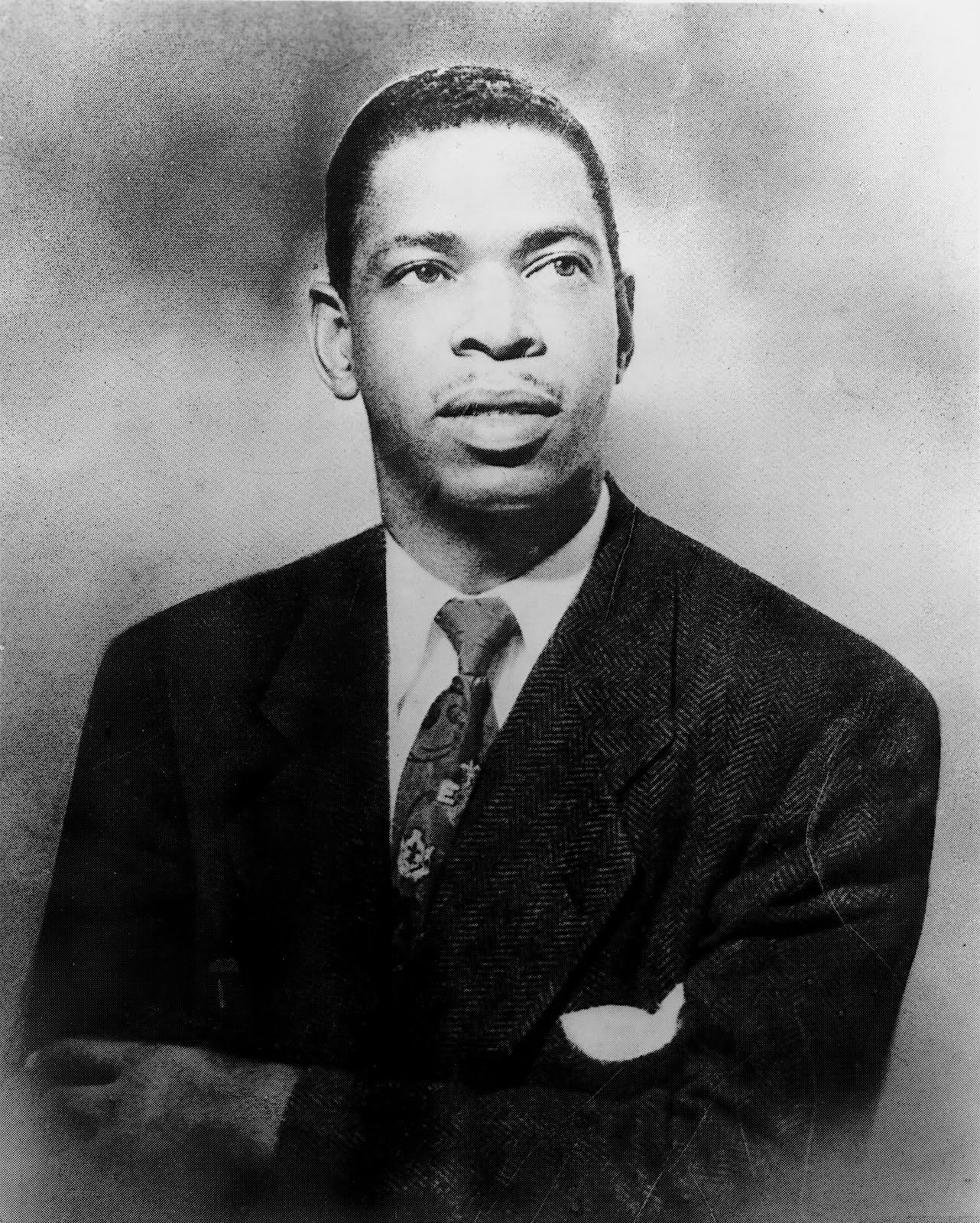
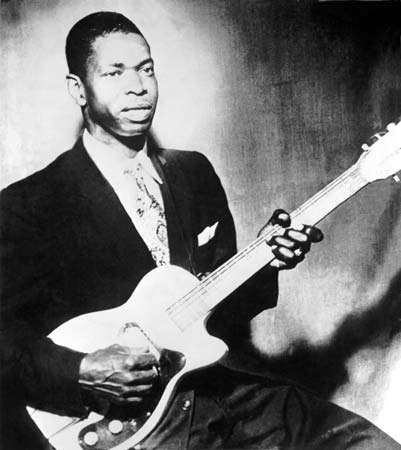
Elmore James (January 27, 1918 – May 24, 1963) was an American blues guitarist, singer, songwriter and band leader. He was known as "the King of the Slide Guitar" and had a unique guitar style, noted for his use of loud amplification and his stirring voice.
James was born Elmore Brooks in the old Richland community in Holmes County, Mississippi (not to be confused with two other locations of the same name in Mississippi). He was the illegitimate son of 15 year old Leola Brooks, a field hand. His father was probably Joe Willie "Frost" James, who moved in with Leola, and so Elmore took this as his name. His parents adopted an orphaned boy at some point named Robert Holston.
Elmore began making music at the age of 12 using a simple one string instrument ('diddley bow' or 'jitterbug') strung up on a shack wall. As a teen he was playing at local dances under the names Cleanhead and Joe Willie James. His first marriage was to Minnie Mae, circa 1942 (whom he apparently never divorced). He subsequently married twice, to Georgianna Crump in 1947 and to a woman called Janice circa 1954. (Another reported marriage of Elmore to a Josephine Harris has been found to be a mistaken record of a different Elmore James.)
Becoming a well known musician in those days, with the rewards of prestige, good free food, illicit free liquor, women's favors, the promise of escape from the hard agricultural work, etc., must have been as attractive to Elmore as it was to the other musicians of that time and earlier, such as the 'second' Sonny Boy Williamson, with whom he played and Robert Johnson with whom he also possibly played. Although Robert Johnson died in 1938, James (like many other musicians) was strongly influenced by him, and by Kokomo Arnold and Tampa Red. Elmore recorded several of Tampa's songs, and even inherited from his band two of his famous 'Broomdusters', 'Little' Johnny Jones (piano) and Odie Payne (drums). There is a dispute as to whether Robert Johnson or Elmore wrote James' trademark song, "Dust My Broom".
James's demise may have been hastened by his lifelong taste for, and manufacture of, moonshine whiskey, to which he was introduced at an early age. Alcohol definitely killed his band - mates / friends Willie Love and Johnny Jones at an early age. His regular rhythm guitarist Homesick James maintained his longevity was due to his not partaking of the heavy drinking sessions after — and often during — gigs, a refusal that was unpopular with the rest of the band. James was also reportedly an extremely fast driver who also loved hunting with guns and dogs in Mississippi.
During World War II James joined the United States Navy, was promoted to coxswain and took part in the invasion of Guam against the Japanese. Upon his discharge, Elmore returned to central Mississippi and eventually settled in Canton with his adopted brother Robert Holston; it was at this time he learned that he had a serious heart condition. Working in Robert's electrical shop, he devised his unique electric sound, using parts from the shop and an unusual placement of two D'Armond pickups. He began recording with Trumpet Records in nearby Jackson in January 1951, first as sideman to the second Sonny Boy Williamson and also to their mutual friend Wille Love and possibly others, then debuting as a session leader in August with "Dust My Broom". It was a surprise R&B hit in 1952 and turned James into a star. He then broke his recording contract with Trumpet Records to sign up with the Bihari Brothers through Ike Turner (who played guitar and piano on a couple of his early Bihari recordings). His "I Believe" was another hit a year later. During the 1950s he recorded for the Bihari brothers' Flair Records, Meteor Records and Modern Records labels, as well as for Chess Records and Mel London's Chief Records (his "It Hurts Me Too" was later a hit when he re-recorded it for Enjoy Records). His backing musicians were known as the Broomdusters. In 1959 he began recording for Bobby Robinson's Fire Records label. These include "The Sky Is Crying" (credited to Elmo James and His Broomdusters), "My Bleeding Heart", "Stranger Blues", "Look on Yonder Wall", "Done Somebody Wrong", and "Shake Your Moneymaker", all of which are among the most famous of blues recordings.
James died of his third heart attack in Chicago in 1963,
just prior to a tour of Europe with that year's 'American Folk Blues
Festival.' He was buried in the Newport Baptist Church Cemetery in Ebenezer, Mississippi.
James played a wide variety of "blues" (which often crossed over into other styles of music) similar to that of Muddy Waters, Howlin' Wolf and some of B.B. King's work, but distinguished by his guitar's vastly more powerful sound (arguably only equaled in technical ability by King, although in a different style) coming from a modified, hollow body traditional acoustic guitar, which sounded like the more modern solid body guitars. He most often played using a slide, but on several recordings he plays without. His voice and style were as instantly recognizable as King's, Muddy's and Wolf's and until he fell afoul of the Chicago union, he and his 'Broomdusters' were as popular in the Chicago clubs as any of these musicians' bands. James could be reportedly 'difficult' (drinking on the job, not paying out cash, abandoning musicians, double booking etc.) Due to his early death, just before the 1960s "blues boom", and the silence of other famous blues performers, the then current music writers only being interested in 'the stars' not caring to interview his ex-band members, immediate family, children, friends et. al., little is known about him. There are no known photos of James performing, apart from those taken (some at the following occasion, and some at a packed club with stylishly dressed couples dancing closely) by George Adins, and no other detailed descriptions or any live recordings.
Muddy Waters took the Belgian blues fan (George Adins) to see James play in Chicago in 1959, Adins recalled,
Elmore will always remain the most exciting, dramatic blues singer and guitarist that I've ever had a chance to see perform in the flesh. On our way we listened to him on the radio as Big Bill Hill ... was broadcasting direct from that place. I was burning to see Elmore James and before we even pushed open the door of the club, we could hear Elmore's violent guitar sound. Although the place was overcrowded, we managed to find a seat close to the bandstand and the blues came falling down on me as it had never done before. Watching Elmore sing and play, backed by a solid blues band (Homesick James, J.T. Brown, Boyd Atkins and Sam Cassell) made me feel real fine. Wearing thick glasses, Elmore's face always had an expressive and dramatic look, especially when he was real gone on the slow blues. Singing with a strong and rough voice, he really didn't need a mike. On such slow blues as "I'm Worried - "Make My Dreams Come True" - "It Hurts Me", his voice reached a climax and created a tension that was unmistakably the down and out blues. Notwithstanding that raw voice, Elmore sang his blues with a particular feeling, an emotion and depth that showed his country background. His singing was... fed, reinforced by his own guitar accompaniment which was as rough, violent and expressive as was his voice. Using the bottleneck technique most of the time, Elmore really let his guitar sound as I had never heard a guitar sound before. You just couldn't sit still! You had to move...
George also witnessed James at 'Alex Club' in West Side Chicago where...
... he always played for a dance audience and he made the people jump. "Bobby's Rock" was at that time one of the favorite numbers with the crowd and Elmore used to play [it] for fifteen minutes and more. You just couldn't stand that hysteric sound coming down on you. The place was rocking, swinging!
The nearest we have to a recording of a 'live' set by James is his last recorded session by Bobby Robinson, in New York City in 1963 shortly before James death. This session features several takes of "Hand In Hand" which was abandoned and James then played a 'live' set.
His best known song is the blues standard "Dust My Broom" (also known as "Dust My Blues"). The song gave its name to James's band, The Broomdusters. The song's opening slide guitar riff
is one of the best known sounds in all of blues. It is essentially the
same riff that appeared in the recording of the same song by Robert Johnson, but James played the riff with electric slide guitar. It was even transformed into a doo-wop chorus on Jesse Stone's "Down in the Alley", recorded by The Clovers and Elvis Presley. Stone transcribed the riff as: "Changety changety changety changety chang chang!"
Most electric slide guitar players will admit to the massive, if not, total influence of James' style. He was also a major influence on such successful 'Blues' guitarists as 'Homesick James' (who was a member of Elmore's band 'The Broomdusters' and featured on many of his recordings) John Littlejohn, Hound Dog Taylor, J.B. Hutto and many others. He also influenced many rock guitarists such as The Rolling Stones' Brian Jones (Keith Richards writes in his book that at the time he met Brian Jones, Brian called himself Elmo Lewis, and that he wanted to be Elmore James) and Fleetwood Mac's Jeremy Spencer. John Mayall included the song, "Mr. James," on his 1969 "Looking Back" album as a dedication to James. His songs "Done Somebody Wrong" and "One Way Out" were often covered by The Allman Brothers Band, who cited him as a major influence. James was also covered by blues - rock band Stevie Ray Vaughan and Double Trouble many times in concert. The most famous of these covers is one that came by an indirect route - James' fellow bluesman Albert King recorded a cover of "The Sky Is Crying", and Stevie Ray Vaughan copied King's version of the song. That song was also covered by George Thorogood on his second album, Move It On Over and by Eric Clapton on his album There's One in Every Crowd.
The most famous guitarist who admired Elmore James was Jimi Hendrix. Early in his career Jimi styled himself variously as 'Maurice James' and subsequently as 'Jimmy James.' This, according to former bandmate and recording partner Lonnie Youngblood, was a tribute to Elmore James. There is a photo of Hendrix (that can be seen in the sleeve of his :blues album) in London wearing his iconic military jacket and holding Elmore James's UK LP The Best Of Elmore James. (Hendrix was frequently photographed throughout his performing career holding LP covers of musicians that influenced him.) He performed James' "Bleeding Heart" during the Experience's Royal Albert Hall concert in 1969, and also with the Band of Gypsys at their New Year's concerts at the Fillmore East in 1969 / 70 as well as recording two different versions of it in the studio. Buddy Miles also sang lyrics along with Jimi playing some motifs from James' "The Sky Is Crying" during his famous jam session the Newport Pop Festival on June 22, 1969 (the video is now available in collector's circles) as well as quoting several lyrics and motifs from Elmore's catalog throughout his career.
James is mentioned in The Beatles' song "For You Blue": while John Lennon plays the slide guitar (James' trademark), George Harrison says, "Elmore James got nothin' on this, baby." Other artists influenced by Elmore James include Frank Zappa and Jeffrey Evans of the band 68 Comeback.
The Grateful Dead, John Primer (Blue Steel CD), Billy Gibbons and Eric Clapton are other notable artists to have recorded Elmore James covers. Clapton also recorded a song with Jimmy Page called "Tribute to Elmore" that first appeared on the 1968 compilation album Blues Anytime Vol. 1. On the 1974 record Second Album, Roy Buchanan included an instrumental song he wrote titled "Tribute to Elmore James," which begins with James' classic slide guitar riff, and uses his soloing style throughout.
James's older cousin "Homesick" James Williamson, a regular companion from an early age, played with James in the Broomdusters from 1957 on. He was also a successful blues man who played electric slide guitar in James's style. He continued to record and tour until his death in 2006.
James's music & style still today has immense influence upon
today's modern blues icons, including the young Derek Trucks of the
Allman Brothers and The Derek Trucks Band, who has attributed James as
his most predominant influence, and inspiration.
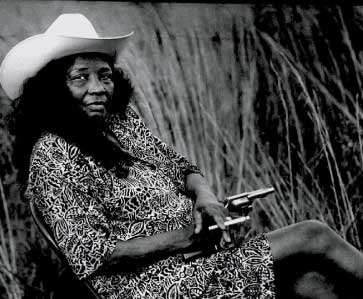
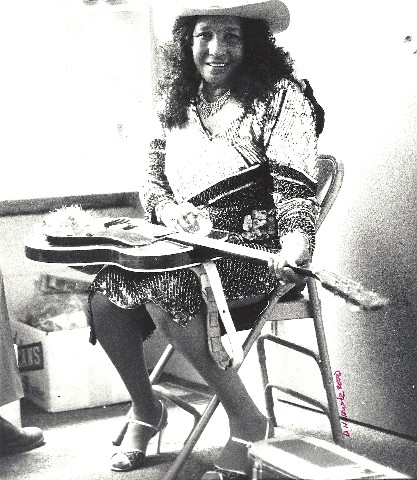
Jessie Mae Hemphill (October 18, 1923 – July 22, 2006) was an American award winning electric guitarist, songwriter, and vocalist specializing in the primal, northern Mississippi country blues traditions of her family and regional heritage.
Hemphill was born near Como and Senatobia, Mississippi, in northern Mississippi just east of the Mississippi Delta. She began playing the guitar at the age of seven and also played drums in various local Mississippi fife and drum bands. Her musical background began with playing snare drum and bass drum in the fife - and - drum band led by her grandfather, Sid Hemphill. Aside from sitting in at Memphis bars a few times in the 1950s, most of her playing was done in family and informal settings such as picnics with fife and drum music until her 1979 recordings.
The first field recordings of her work were made by blues researcher George Mitchell in 1967 and ethnomusicologist Dr. David Evans in 1973 when she was known as Jessie Mae Brooks, using the surname from a brief early marriage, but the recordings were not released. In 1978, Dr. Evans came to Memphis to teach at Memphis State University (now University of Memphis). The school founded the High Water label in 1979 to promote interest in the indigenous music of the South. Evans made the first high quality field recordings of Hemphill in that year and soon after produced her first sessions for the High Water label.
Hemphill then launched a recording career in the early 1980s, a period which was her heyday. In 1981 her first full length album, She-Wolf, was licensed from High Water and released on France's Vogue Records. In the early 1980s, she performed in a Mississippi drum corps put together by Evans composed of herself, Abe Young, and Jim Harper on Tav Falco's Panther Burns' Behind the Magnolia Curtain album; she also appeared in another drum group with Young and fife - and - drum band veteran Othar Turner in a televised appearance in Mr. Rogers' Neighborhood. Other recordings of hers were released on the French label Black and Blue, and she performed concerts across the United States and other countries including France, Germany, Spain, Italy, Belgium, The Netherlands, Sweden, Switzerland, and Canada. She received the W.C. Handy Award for best traditional female blues artist in 1987 and 1988.
In 1990, her first American full length album, Feelin' Good, was released, which also won a Handy Award for best acoustic album. Hemphill suffered a stroke that paralyzed her left side in 1993, preventing her from playing guitar, resulting in her retiring at that time from her blues career. However, she did continue to play, accompanying her band on the tambourine.
In 2004, the Jessie Mae Hemphill Foundation released Dare You to Do It Again, a double album of gospel standards, newly recorded by the ailing vocalist singing and playing tambourine with accompaniment from Steve Gardner, DJ Logic, and descendants of the late musicians Junior Kimbrough, R.L. Burnside, and Otha Turner. The release, her first recordings since the 1993 stroke, also included a DVD. Also in 2004, Inside Sounds released Get Right Blues, containing material recorded from 1979 through the early 1980s; Black & Blue released Mississippi Blues Festival, which included seven live tracks by her from a Paris concert in 1986.
On July 22, 2006, Jessie Mae Hemphill died at The Regional Medical Center in Memphis, after experiencing complications from an ulcer.
As one of the earliest successful female blues musicians, Hemphill has
been an influential and pioneering artists. Her songs have been
performed by indie musician Chan Marshall of Cat Power. Marshall used one of Hemphill's tracks on her album Jukebox without credit, to much controversy. In 2003, her protege and collaborator, Olga Wilhelmine Munding founded the Jessie Mae Hemphill Foundation
to preserve and archive the indigenous music of northern Mississippi
and to provide assistance for musicians in need from the region who
could not survive on meager publishing royalties. One of her songs was also featured in the dance performance Tales From the Creek, by Reggie Wilson's Fist and Heel Performance Group in a series of events celebrating black culture in Union Square Park in 1998.
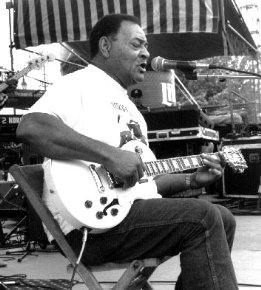
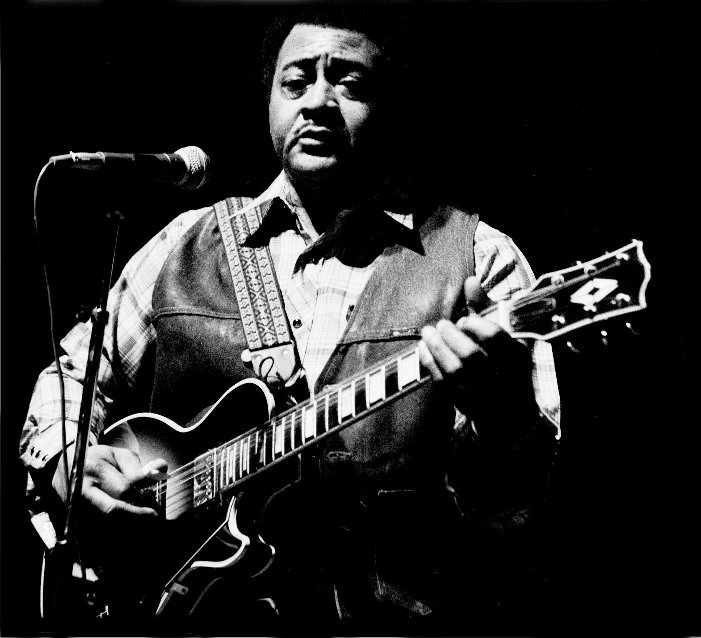
David "Junior" Kimbrough (July 28, 1930 — January 17, 1998) was an American blues musician. His best known work included "Keep Your Hands Off Her" and "All Night Long". Music journalist Tony Russell stated "his raw, repetitive style suggests an archaic forebear of John Lee Hooker, a character his music shares with that of fellow North Mississippian R.L. Burnside".
Junior Kimbrough was born in Hudsonville, Mississippi, United States, and lived in the North Mississippi Hill Country near Holly Springs. He recorded for the Fat Possum Records label. He was a long time associate of labelmate R.L. Burnside, and the Burnside and Kimbrough families often collaborated on musical projects. This relationship continues today. Rockabilly musician and friend Charlie Feathers called Kimbrough "the beginning and end of all music." This is written on Kimbrough's tombstone outside his family's church, the Kimbrough Family Church, in Holly Springs.
Beginning around 1992, Kimbrough operated a juke joint known as "Junior's Place" in Chulahoma, Mississippi, which attracted visitors from around the world, including members of U2, Keith Richards, and Iggy Pop. Kimbrough's sons, musicians Kinney and David Malone Kimbrough, kept it open following his death, until it burned to the ground on April 6, 2000.
Junior Kimbrough died of a heart attack in 1998 in Holly Springs following a stroke, at the age of 67.
Kimbrough began playing guitar in his youth, and counted Lightnin' Hopkins as an early influence. In the late 1950s he began playing in his own style, which made use of mid - tempo rhythms and a steady drone he played with his thumb on the bass strings of his guitar. This style would later be cited as a prime example of regional north hill country blues. His music is characterized by the tricky syncopations between his droning bass strings and his mid - range melodies. His soloing style has been described as modal and features languorous runs in the mid and upper register. The result is complex and funky, described by music critic Robert Palmer
as "hypnotic". In solo and ensemble settings it is often polyrhythmic,
which links it explicitly to the music of Africa. Fellow North
Mississippi bluesman and former Kimbrough bassist Eric Deaton has
suggested similarities between Junior Kimbrough's music and Malian
bluesman Ali Farka Touré's.
In 1966 Kimbrough traveled to Memphis from his home in North Mississippi and recorded for the R&B / gospel producer and owner of the Goldwax record label, Quinton Claunch. Claunch was a founder of Hi Records (whose entire catalog will be reissued by Fat Possum) and is known as the man that gave James Carr and O.V. Wright their start. Kimbrough recorded one session in one afternoon at American Studios. Claunch declined to release the recordings, deeming them too country. Forty some years later, Bruce Watson of Big Legal Mess Records approached Claunch to buy the original master tapes and the rights to release the recordings made that day. These songs were released by Big Legal Mess Records in 2009 as First Recordings. Kimbrough's debut release was a cover version of Lowell Fulson's "Tramp" released as a single on independent label Philwood in 1967. On the label of the record Kimbrough's name was spelled incorrectly as Junior Kimbell and the song "Tramp" was listed as "Tram?" The b-side was "You Can't Leave Me".
Among his other early recordings are two duets with his childhood friend Charlie Feathers in 1969. Feathers counted Kimbrough as an early influence and Kimbrough gave Feathers some of his earliest lessons on guitar.
Kimbrough recorded very little in the 1970s, contributing an early version of "Meet Me in the City" to a European blues anthology. With his band, the Soul Blues Boys, Kimbrough recorded again in the 1980s, releasing a single in 1982 ("Keep Your Hands Off Her" b/w "I Feel Good, Little Girl"). The High Water label recorded a 1988 session with Kimbrough and the Soul Blues Boys, releasing it in 1997 with his 1982 single as "Do The Rump".
Kimbrough came to national attention in 1992 with his debut album, All Night Long. Robert Palmer produced the album for Fat Possum Records, recording it in a local church with Junior's son Kent "Kinney" Kimbrough (aka Kenny Malone) on drums and R.L. Burnside's son Garry Burnside on bass guitar. The album featured many of his most celebrated songs, including the title track, the complexly melodic "Meet Me In The City," and "You Better Run" a harrowing ballad of attempted rape. All Night Long earned near unanimous praise from critics, receiving four stars in Rolling Stone. His stock continued to rise the following year after live footage of him playing "All Night Long" in one of his juke joints appeared in the Robert Mugge directed, Robert Palmer narrated film documentary, Deep Blues: A Musical Pilgrimage to the Crossroads. This performance was actually recorded earlier in 1990.
A second album for Fat Possum, Sad Days, Lonely Nights, followed in 1994. A video for the album's title track featured Kimbrough, Garry Burnside and Kent Kimbrough playing in Kimbrough's juke joint. The last album he would record, Most Things Haven't Worked Out, appeared on Fat Possum in 1997. Following his death in 1998 in Holly Springs, Fat Possum released two posthumous compilation albums of material Kimbrough recorded in the 1990s, God Knows I Tried (1998) and Meet Me in The City (1999). A greatest hits compilation, You Better Run: The Essential Junior Kimbrough, followed in 2002. Fat Possum also released a tribute album, Sunday Nights: The Songs of Junior Kimbrough, in 2005, which featured Iggy & The Stooges (Kimbrough once toured with frontman Iggy Pop), The Black Keys and Mark Lanegan. The Black Keys have released an album composed entirely of covers of Junior's music, Chulahoma. Richard Johnston, a Kimbrough protege, keeps this musical tradition alive with one of Junior's sons, via live performances on Beale Street in Memphis.